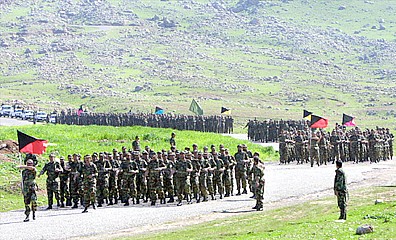Opinion (Aparisim Ghosh): Will Bush Make Any Progress With an Iraqi Shi'ite Leader?

Members of the Iranian-backed Badr Brigade march in 2003
What exactly can President Bush expect from his White House meeting Monday with Abdel-Aziz al-Hakim, the Iraqi Shi'ite leader? The blunt answer: probably not much more than he got from his discussion last week with Prime Minister Nuri al-Maliki. If the President is hoping al-Hakim will be any more favorably inclined toward U.S. interests than the Prime Minister is, Bush is in for frustrating meeting. A hardline Islamist, Al-Hakim has frequently given fiery anti-American speeches, denouncing U.S. policies in Iraq, Lebanon and Israel.
The Bush administration's main goal in Iraq at the moment is to halt the sectarian killings — blamed in large part on Shi'ite militias, including the armed wing of Hakim's own party, the Supreme Council for the Islamic Revolution in Iraq. Known as the Badr Organization, the militia was formed in Iran during the Saddam era, and it is known to take guidance (and, some of its critics allege, perhaps even its orders) from Tehran. U.S. officials have been pressing the Iraqi government to disarm such militias. The President brought up that suggestion at his breakfast meeting with al-Maliki in Jordan, only to be swiftly rebuffed. And that's exactly the reaction Bush can expect from al-Hakim.
The Shi'ite leader has long maintained that the militias perform a valuable service, defending neighborhoods from attack by Sunni insurgents. In interviews with TIME, he has described the militias as akin to neighborhood watch committees. Bush may also find al-Hakim unwilling to listen to any complaints about the Mahdi Army of Moqtada al-Sadr. Although the two Shi'ite clerics are rivals, they have a mutual interest in keeping the U.S. at arm's length. Al-Hakim knows that if he goes along with any American plan to crack down on al-Sadr's militia, his own Badr Organization will likely be next.
Read the rest at Time

<< Home